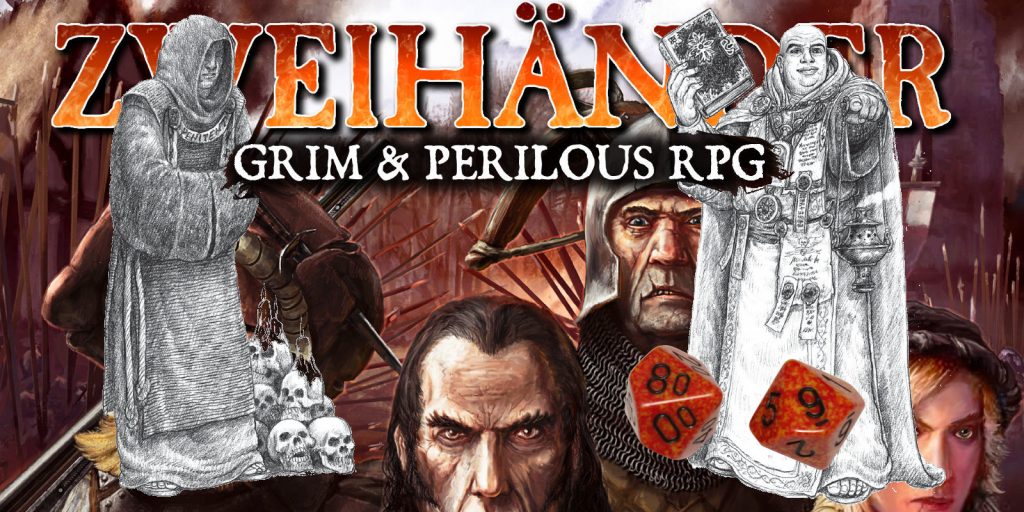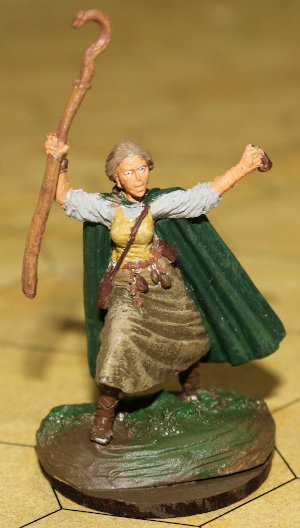From Monk to Preacher

Zweihänder, much like Warhammer Fantasy RPG before it, has a rather odd character advancement system. It’s only odd though in that it’s different to most other systems. Like any system with a concept of ‘classes’ it has its flaws, but it gives the game a somewhat unique feel.
When you generate your character, you start in your basic tier, which provides you with your starting profession. This profession provides a set of skills, bonuses and abilities to select from as you gain Reward Points (experience). As with the rest of character generation, the profession you start with is randomly determined.
Each profession provides 10 skills, 7 ability bonuses and 3 special abilities (collectively called advances), and each costs 100 Reward Points to buy, but you can purchase them in any order you like. The only limitation is that you must eventually purchase them all in order to advance in your career. This means you could end up purchasing skills or abilities you don’t actually have any intent to use, and are also restricted from purchasing skills and abilities which you might actually want.
It’s sort of a bit like a class system, but not entirely.

So my character Eva, who started as a Monk, could purchase Education and Folklore as skills, but could not purchase Charm or Leadership. Given that she had no desire to get into combat (she had access to Simple Melee as a skill, but she really was not good at it), and I played her as a more social orientated character, this was a bit of a limitation. So she liked to solve problems socially, but wasn’t great at it.
Now that she’s spent all her points on purchasing skills and abilities from her Basic Tier, she is able to move on to the second, Intermediate Tier. This allow her to move to a new profession. The main advantage of the Intermediate Tier is that you get to chose it. As long as it’s in the same Archetype (Academic, Warrior etc) as your basic tier, you can just select one. Other professions you need the permission of your GM, as well as a good reason.
Looking at what Eva wants to do – gain some social skills and learn magic – Preacher seems to be a good choice. It stays with the religious angle of the character, provides her with Divine Magic, and has a set of academic and social skills.
One thing to consider when selecting your next profession is the issue of min-maxing. Each profession will give you +10% on certain skills, and you can only take each skill once per profession.
So if I want to fill out new skills, then I need a profession that has a different set of skills than my first profession. But that means they’ll all be at only +10%. If I select a profession which heavily overlaps my first profession, then I’ll get lots of skills at +20% (since bonuses from multiple professions stack). Likewise, when I go for the third and final profession, I can only get the maximum bonus of +30% by selecting a third overlapping profession.
The Preacher overlaps with academic skills, which Eva uses a lot, and gives me some bonuses in skills I don’t have, so is probably a good mix of the two.
The first part of purchasing the new profession is to spend 200 reward points on its professional trait. In the basic tier, each advance cost 100 points, in the intermediate tier they cost 200 points. If Eva ever survives to the third and final Advanced Tier then they will cost 300 points.
For the preacher, the professional trait is Fire and Brimstone, which allows me to flip the results of a Leadership test in order to succeed. This basically means if I roll 92 (a failure) on my d100, I can switch it to 29 (a success). If I succeed, I also always get a critical success. Not bad. On top of that, I get to use the Ritual of Blessed Sacrament, which basically allows me to bless places and people, and create holy water (though I seem to need holy water to use the ritual, so I’m not sure how this is meant to work).
Fire and Brimstone: A Preacher’s sermons are filled with impassioned words, evoking vivid images of sinners in anguish and torment.
When I purchase the professional trait, I also get the special trait and drawback for free. The first is Divine Magick, which allows me to learn and use magical spells. The second is Lure of Power, which gives me a chance to invoke a Chaos Manifestation when using magic. Not so good.
Indeed, magic in Zweihänder seems to be… bad. Not bad as in not useful, but bad as in there’s a high chance of things going wrong and bad things happening. This is definitely not D&D where you toss around spells whenever you feel like it, so I feel that I’ll only be using magic when absolutely necessary. This definitely fits with the sort of world that Zweihänder is trying to portray. However, I need to do a lot more reading up on the magic rules and select my three starting spells.
In terms of what Eva can do, she currently has 600 reward points. 400 of these need to be spent on finishing her Basic Tier (buying the skills Drive, Handle Animal and Tradecraft which she doesn’t really need, and picking up Multilingual which overlaps with another ability she already has), leaving 200 to spend on her professional trait and none left over.
This means she doesn’t have a Leadership skill, which is a trained-only skill. She also won’t have Incantation, which is another trained-only skill and needed to cast magic. So for now she won’t be able to make use of the special abilities she’s just picked up.
Technically, she could use these skills, but doing so means she will always flip to fail. What that means when combined with the ‘flip to succeed’ of my Fire and Brimstone ability I don’t know. But Eva is now heading down the path of being a Preacher, and will hopefully pick up enough Reward Points to pick up these skills soon enough.
So character progression is a bit more free-form than a pure class based system, but obviously not as flexible as a pure skill based system. The huge range of professions to choose from provide lots of options, but the chances are none of them are going to be perfect for you want. But then, that’s often how life is.
I definitely don’t have a problem with how things work in Zweihänder, especially given it’s a core part of the system that makes it stand out from other systems in an interesting way.